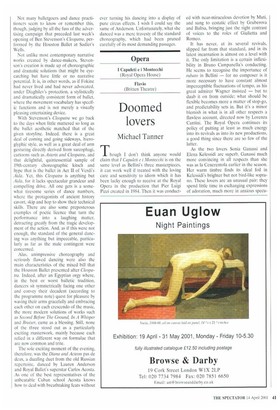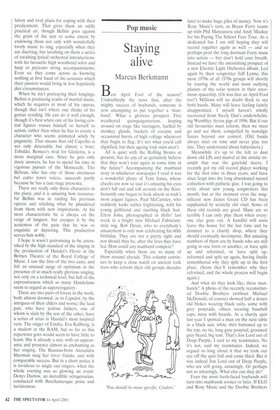Opera
I Capuleti e i Montecchi (Royal Opera House) Flavio (Britten Theatre)
Doomed lovers
Michael Tanner
Though I don't think anyone would claim that I Capuleti e i Montecchi is on the same level as Bellini's three masterpieces, it can work well if treated with the loving care and sensitivity to idiom which it has been lucky enough to receive at the Royal Opera in the production that Pier Luigi Pizzi created in 1984. Then it was conduct
ed with near-miraculous devotion by Muti, and sung to ecstatic effect by Gruberova and Baltsa, bringing just the right contrast of voices to the roles of Giulietta and Romeo.
It has never, at its several revivals, slipped far from that standard, and in its latest incarnation is almost on a level with it. The only limitation is a certain inflexibility in Bruno Campanella's conducting. He seems to recognise the importance of rubato in Bellini — for no composer is it more necessary to have constant almost imperceptible fluctuations of tempo, as his great admirer Wagner insisted — but to daub it on from outside: what should be flexible becomes more a matter of stop-go, and predictability sets in. But it's a minor blemish in what is in all other respects a flawless account, directed now by Lorenza Cantini. The Royal Opera continues its policy of putting at least as much energy into its revivals as into its new productions, a good thing since there are so few of the latter,
As the two lovers Sonia Ganassi and Elena Kelessidi are superb, Ganassi much more convincing in all respects than she was as la Cenerentola earlier in the season. Her warm timbre finds its ideal foil in Kelessidi's brighter but not bird-like soprano. These lovers are an unusual pair: they spend little time in exchanging expressions of adoration, much more in anxious specu lation and rival plans for coping with their predicament. That gives them an oddly practical air. though Bellini goes against the grain of the text to some extent by endowing them not only with wonderfully lovely music to sing, especially when they are duetting, but lavishing on them a series of ravishing lyrical orchestral introductions, with his favourite high woodwind solos and harp or pizzicato string accompaniments. Even so, they come across as knowing nothing at first hand of the ecstasies which their passion would bring in less hopelessly dire circumstances.
When he isn't portraying their longings, Bellini is producing reams of martial music, which he requires in most of his operas, though that isn't where one thinks of his genius residing. He can do it well enough, though it's best when one of his loving central figures rouses himself or herself to action, rather than when he has to create a character who seems animated solely by pugnacity. That means that old Capellio is not only detestable but almost a bore: Tebaldo, Romeo's rival for Giulietta, is a more marginal case. Since he gets only dusty answers, he has to spend his time in vigorous pursuit of the Montecchi. Tito Beltran, who has one of those strenuous bel canto tenor voices, succeeds partly because he has a cute stage presence.
There are really only three characters in the piece, and it is amazing how resourceful Bellini was in raiding his previous operas and stitching what he plundered from them with new inspirations. At his most characteristic he is always on the verge of languor, but escapes it by the acuteness of the pain that he was so exquisite at depicting. This production serves him nobly.
I hope it wasn't patronising to be astonished by the high standard of the singing in the production of Handel's Flavio at the Britten Theatre of the Royal College of Music. I saw the first of the two casts, and felt an unusual surge of optimism in the presence of so much really glorious singing, not only on a technical level, but full of the expressiveness which so many Handelians seem to regard as supererogatory.
There are two pairs of lovers in the work, both almost doomed, as in Capuleti, by the intrigues of their elders and worse; the lead pair, who have jealous fathers, one of whom is slain by the son of the other, have a series of arias in Handel's most inspired vein. The singer of Emilia, Eva Kal!berg, is a student at the RAM, but so far as this repertoire goes would seem to have little to learn. She is already a star, with an appearance and presence almost as enchanting as her singing. The Russian-born Alexandra Sherman sang her lover Guido, and with comparable success. But in a short notice it is invidious to single out singers, when the whole evening was so glowing an event. Denys Darlow, an incredible octogenarian, conducted with Beechamesque poise and incisiveness.



























































 Previous page
Previous page